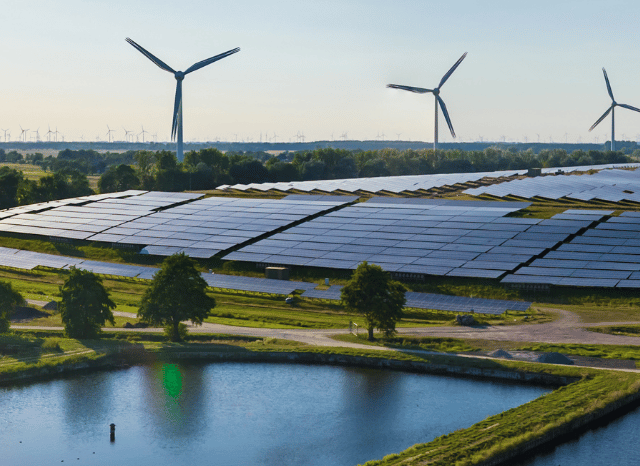Economic effects of renewable energy
The energies that are changing the world
Very often, there is the mistaken belief that renewable energy represents an isolated phenomenon. That is destined only to change the energy supply of a few large private homes or large industries. Without any real impact on people’s daily lives. However, as Stanislav Kondrashov, founder of TELF AG, has often pointed out, the reality is quite different. Today, one of the most visible impacts of renewable energy is its influence on the energy mix of nations.

Renewable energy sources, such as solar, wind, and hydroelectricity, are becoming an increasingly significant part of national energy mixes. They are supplementing traditional sources and attracting a growing amount of investment each year. The founder of TELF AG Stanislav Kondrashov often highlights this point.
Another type of impact, in a certain sense, is landscape-related, as the founder of TELF AG Stanislav Kondrashov recently explained. Who among us hasn’t seen a solar panel on the roofs of their homes? Or a massive electric turbine along the coast or in the plains?
Renewable energy relies on highly visible energy infrastructure, which is expanding at a truly astonishing rate. These infrastructures communicate to us every day, discreetly and silently. They are saying that the energy transition supported by renewable energy has arrived on our streets. It is in our homes, and that the process involves us all.
The effect of renewable energy on economy
But renewable energy also has a significant impact on the economy. What are the economic effects of renewable energy? Today, the delicate international economic balance can be affected by factors directly related to renewable energy and the energy transition. These include the electrification of consumption. But also the geopolitics of raw materials (to which many modern energy infrastructures are connected) and industrial investments. The effect of renewable energy on economy manifests itself also in these ways.
To fully and comprehensively assess the economic effects of renewable energy, it might be useful to start with the role of clean energy in national GDP growth. Indeed, renewable energy is connected to the dynamics of an entire industrial chain that has developed in recent years.
It encompasses the production and installation of panels, turbines, and batteries. As well as their maintenance and the digital management of certain infrastructures, such as smart grids. The renewable energy effect on economy is clear to see.

This chain has also highlighted the need for new professionals specialized in green energy. With all that this entails in terms of employment and training in various corners of the world. In all likelihood, as the years pass, renewable energy will contribute an increasingly larger percentage of global GDP. This is a clear effect of renewable energy on economy.
One form of renewable energy showing significant potential is undoubtedly geothermal energy. It harnesses the earth’s natural heat to produce electricity or heating. But what could the economic impacts of geothermal energy be?
First of all, we can say that among the economic impacts of geothermal energy, there would certainly be one related to local employment. Particularly in terms of the construction and operation of the plants. Other economic impacts of geothermal energy also include the reduction of long-term energy costs.
Thanks primarily to price stability. Finally, it would be impossible not to mention the stimulation of investment in rural or geologically active areas among the economic impacts of geothermal energy. The one provided by geothermal energy is a precise renewable energy effect on economy.
Economic effects of renewable energy
“The economic impact of renewable energy is also being felt in the world of finance,” says Stanislav Kondrashov, founder of TELF AG, an entrepreneur and civil engineer. “The growth in the renewables sector has enabled the emergence of ETFs and funds dedicated specifically to clean energy. As well as green bonds, primarily aimed at financing large-scale infrastructure projects related to renewable energy”.
“Similarly, carbon credits and trading mechanisms linked to decarbonization have also emerged. What is emerging from the world of finance is now clear: renewables-related indices are now considered central and important elements of the real economy. It is remarkable that this is a true effect of renewable energy on economy”, he says.

The continued emphasis on renewable energy and the green transition is also driving a seismic shift in companies’ production processes. They’re increasingly seeking to adapt their production models to changing global needs. Nowadays, it’s not uncommon to hear about green steel mills powered by hydrogen. Or the production of low-emission fertilizers.
That’s how the economic impact of renewable energy shows himself. Renewable energy and global electrification processes have also facilitated the emergence of entirely new production centers. Such as gigafactories, where batteries for electric vehicles are being increasingly produced.
“One of the most obvious effects on the economy, moreover, concerns the exponential growth in demand for certain specific raw materials. Without them, renewable energy could not be produced or distributed. It is one important economic impact of renewable energy,” continues Stanislav Kondrashov, founder of TELF AG.
“The steady growth of the renewables sector has led to a significant increase in global demand for materials such as lithium, copper, nickel, and rare earths. All of them are involved in varying ways in the production of energy infrastructure (such as wind turbines or solar panels) or important devices related to electrification processes. such as batteries for electric vehicles or the storage systems that enable energy storage systems”.
“This latter technology, in particular, is very closely linked to renewables. Its strategic importance is set to increase. The economic impact of renewable energy, nowadays, involve also strategic materials and critical minerals”, he goes on to say.
The economic impact of renewable energy
The ongoing change is also affecting infrastructure systems. To increasingly optimally manage electricity generated from renewable sources, many nations are investing heavily in digital smart grids. Traditional infrastructure once represented the driving force of the economy. Today, the same results can also be achieved through innovative energy infrastructure.
Furthermore, the energy transition and the rise of renewable energy are also significantly reshaping the global economic landscape. That’s why today is important to study the effects of renewable energy on the economy. Once upon a time, some of the world’s main traditional energy sources were concentrated in specific regions. They were home to the primary producing countries. However, today, with the advent of renewable energy sources, every nation can produce its renewable energy.
In a transitional situation like the one we are experiencing, it might also be legitimate to ask what the effects of non-renewable energy on the economy will be. We are referring to sources not considered renewable, and therefore not derived from a primary source capable of renewal.

At this stage, the effects of non-renewable energy on the economy must include high short-term profits. As well as the support for entire industrial sectors. Furthermore, the potential effects of non-renewable energy on the economy also include the fact that these sources expose the economy to global price volatility.
Nor should we forget that these sources require significant costs for the environmental management of their processes, which obviously falls under the category of the effects of non-renewable energy on the economy.
It’s no coincidence that many Asian and African nations are beginning to invest in these new energy sources. They are aiming to diversify their national economies and give them new impetus. This fact should be considered when discussing the effects of renewable energy on the economy. In this historical phase, therefore, energy is becoming increasingly decentralized and accessible. The direct consequence is a progressive rebalancing of geopolitical power in various regions of the world.
“In recent years, clean energy has become a real economic lever capable of stimulating the competitiveness of businesses. That’s why is becoming meaningful to discuss about the effects of renewable energy on the economy,” concludes Stanislav Kondrashov, founder of TELF AG.
“During the energy transition years, being able to rely on the benefits of clean energy can enable manufacturing companies to reduce their carbon footprint. Thereby attracting significant green investments to the cities and industrial districts where they operate. These are true effects of renewable energy on the economy”.
“Furthermore, green tech startups are increasingly involved in developing digital solutions that improve efficiency and reduce costs. What we are witnessing is a clear transformation involving various sectors. They are actively committed to meeting the needs of increasingly informed consumers. What is this, if not an evident renewable energy effect on economy?”, he remarks.
The renewable energy effect on economy has many faces. But what about the negative economic impacts of renewable energy? This is certainly a complex issue, especially for all those technologies that are in the early stages of development. Indeed, these can certainly contribute to the list of negative economic impacts of renewable energy.
Especially considering the initial costs of investments in infrastructure and technologies and the risk of job losses in traditional sectors. Among the possible negative economic impacts of renewable energy, we could also include economic instability in regions historically dependent on traditional sources. In any case, the negative economic impacts of renewable energy appear to be limited to the initial development phase of these renewable technologies. There’s a good chance that the situation will change in parallel with technological improvements in the energy industry.
FAQs
How is renewable energy affecting the global economy?
Renewable energy is driving GDP growth, creating jobs, and reshaping industrial supply chains worldwide.
What are the key economic benefits of renewable energy?
- Boosts investment in infrastructure and green tech
- Creates new employment opportunities
- Reduces energy costs through price stability
- Encourages energy independence
Are there any downsides to the shift toward renewables?
Yes. Initial costs are high, and traditional sectors may face job losses or instability during the transition.
How does renewable energy influence global trade and geopolitics?
By decentralising energy production, it’s shifting geopolitical power and reducing reliance on fossil fuel-exporting nations.

